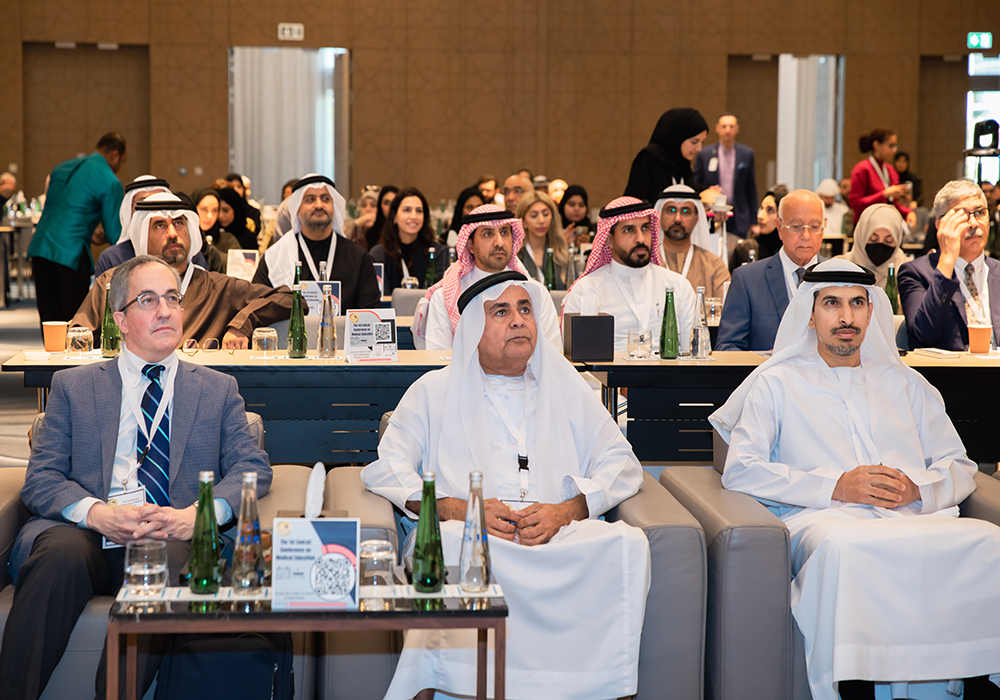
On Saturday morning, the events of the first ‘Emirati Conference on Medical Education’ were launched in Abu Dhabi. The conference is organized by the National Institute for Health Specialties (NIHS) attached to the United Arab Emirates University (UAEU), in cooperation with the Accreditation Council for American Graduate Medical Education (ACGME-i), and in strategic partnership with the Abu Dhabi Health Services Company (SEHA) and the Dubai Health Authority (DHA).
The conference was attended by H.E. Hussain Al-Rand, Assistant Undersecretary for Public Health and Vice Chairman of NIHS Emirati Board of Directors, H.E. Prof. Ghaleb Al Breiki, UAEU Acting Vice Chancellor, H.E. Prof. Aws Al-Shamsan, Secretary General of the Saudi Commission for Health Specialties, His Excellency Dr. Mohammed Al Houqani, NIHS Secretary General, Deans of Medicine from universities across the country, and representatives from the UAE’s health sector, government, and medical education organisations.
In his opening welcome speech, Dr. Hussein Al-Rand placed emphasis on the significance of the first medical education in the UAE, pointing out that it is an important achievement for the UAE health sector. He said that it provides an exceptional platform for decision-makers, leaders, Deans and graduates of Colleges of Medicine to exchange knowledge with experts in the field of medical education. It contributes to enhancing knowledge and practices in line with contemporary standards and to the development of the health sector. It helps prepare medical education organisations for external evaluation and institutional and program accreditation processes. This ensures the continuous scientific and professional development of medical professionals across different health specialities.
Dr. Wadia Mohammed, Director of Medical Education and Research at DHA, explained the importance of the conference as an opportunity for medical education professionals from the public and private sectors to present contemporary effective practices in the field of medical education, to exchange knowledge and experiences, and to evolve medical education in line with the highest international standards.
Dr. Mohammed Al Houqani, added, “Providing world-class healthcare is one of the six pillars of the UAE’s National Agenda, and represents the Government’s continuous efforts to promote the well-being of the UAE community. We are pleased that NIHS has an important role in supporting the Government’s strategy for raising scientific and professional standards in the health sector and enhancing the outcomes of medical and clinical education and training programs.”
Dr. Ghanim Al Hassani, SEHA Director of Academic Affairs said, “SEHA pays great attention to medical education to ensure that we progress in line with the vision of the UAE’s leadership that the UAE should be at the forefront in all fields, including medical education. Our challenge is to keep pace with remarkable acceleration of development and innovation in the global health sector. Medical education and scientific research must now embrace technology, the delivery of hybrid training programs, simulated learning, the use of educational robots, and fields of increasingly specialised precision.
The field of medical education is the basis for providing optimal healthcare to the community.” The conference included three working sessions: clinical competence in the medical education sectors; definition of criteria and activities for professional development, and methods for health professionals to develop pedagogical practices.
The conference also hosted a workshop for representatives of the Saudi Commission for Health Specialties to review its experience in formulating training requirements in the field of nursing.